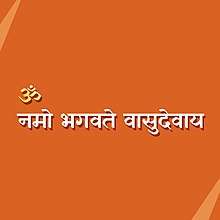Om Namo Bhagavate Vasudevaya
Om Namo Bhagavate Vasudevaya (![]()
| Part of a series on |
| Vaishnavism |
|---|
 |
|
Holy scriptures
|
|
Sampradayas
|
|
Related traditions |
|
|
Sharada Tilak Tantram says:
"Dvadasharno mahamantrah pradhano Vaishnavagame"— The twelve lettered mantra is the chief among vaishnava mantras.
Similarly, this is the ultimate mantra in Shrimad Bhagavatam. This twelve syllable mantra[3] is known as a Mukti (liberation) mantra and a spiritual formula for attaining freedom.[4] The mantra can also be found in the Vishnu Purana.
Meaning
Om Namo Bhagavate Vasudevaya means "Om, I bow to Lord Vasudeva or Lord Vasudev".[5]

| Term | Devanagari | Listen | Meaning |
|---|---|---|---|
| Om | Refers to the Supreme Infinite Spirit or Person. Om represents the Shabda Brahman. | ||
| Namo | Salutation, worship, a common spoken valediction or salutation originating from the Indian subcontinent. 'Namo' नमो is the Sandhi form of 'namas' नमस्, neuter nominative singular. | ||
| Bhagavate | 1. God in Sanskrit, someone who is considered God (or equally powerful, merciful). 'Bhagavate' भगवते is the dative of 'bhagavat' भगवत्. 2. Bhagavate is one who is becoming divine.[6] | ||
| Vasudevaya | Vasudevaya is Vasu means "Life in all beings" Devaya means "God". This means God(life/light) who lives of all beings. Other meaning for
Krishna is also known as Vaasudeva (Krishna), because He was the son of Vasudeva. In the Bhagavad-Gita, Arjuna called Krishna by the name Vaasudeva multiple times. 'Vāsudevāya' वासुदेवाय is the dative of 'vāsudeva' वासुदेव. |
Importance
Om Namo Bhagavate Vasudevaya means "prostration to Vasudeva" who is variously understood as Krishna or Vishnu."[7] Krishna Himself asked His devotees to completely surrender to Him:
सर्वधर्मान्परित्यज्य मामेकं शरणं व्रज ।
अहं त्वां सर्वपापेभ्यो मोक्षयिष्यामि मा शुचः ॥१८- ६६॥
Translation Abandon all varieties of duties or desires and just surrender unto Me. I shall deliver you from all sinful reaction. Do not fear. [Gita 18/66]
Krishna also proclaimed "Everybody should recite "Om Namo Bhagavate Vasudevaya" mantra daily whenever possible so that I will stand by them. I respond to the call of the heart immediately and invariably. See Me in your duties. I am committed to those who are committed to their duties. Believe in putting faith in Me and make Me your own".[8]
Popular culture
- Dhruva used this as his mantra in his penance. Dhruva was initiated by Narada into chanting.[9]
- Swami Vivekananda used this phrase multiple times in his lectures and letters.[10][11]
- Swami Sivananda suggested to repeat mantras like Om or "Om Namo Bhagavate Vasudevaya".[12]
- Vedanta philosopher Dayananda Saraswati wrote a book named "Om Namo Bhagavate Vasudevaya".[13]
See also
- Hare Krishna (mantra)
- Dwadashaakshara Mantra
- Svayam Bhagavan
- Bhagavata Purana
- Om Tat Sat
References
- Prabhakar Balvant Machwe (1983). Bhāratīya Saṃskr̥ti, Volume 1. Bhāratīya Saṃskr̥ti Saṃsada. p. 212.
- Edwin F. Bryant. Krishna: A Sourcebook. Oxford University Press. p. 354.
- Alexander Studholme (2002). The Origins of Oṃ Maṇipadme Hūṃ: A Study of the Kāraṇḍavyūha Sūtra. SUNY Press. p. 177. ISBN 978-0-7914-5389-6.
- "Om Namo Bhagavate Vasudevaya". Retrieved 14 April 2012.
- J. Donald Walters (1 March 2002). The Art and Science of Raja Yoga: Fourteen Steps to Higher Awareness : Based on the Teachings of Paramhansa Yogananda. Crystal Clarity Publishers. pp. 251–. ISBN 978-1-56589-166-1. Retrieved 24 June 2012.
- "Chanting Om Namo Bhagavate Vasudevaya". Retrieved 14 April 2012.
- Swami Krishnananda. "The Significance of Mantra-Japa Sadhana". swami-krishnananda.org. Retrieved 14 April 2012.
- "Autobiography Of Parampoojya Leelavati Karve". yogeshwar.org/. Archived from the original on 4 March 2016. Retrieved 4 May 2012.
- "Dhruva". Vaniquotes. Retrieved 14 April 2012.
- "Swami Vivekananda Letters". Vedanta network Boston. Retrieved 14 April 2012.
- "Swami Vivekananda letter the 15th February [1893]". Ramakrishna Vivekananda Info. Retrieved 14 April 2012.
- "20 Instructions by Swami Sivanananda". Writespirit. Retrieved 14 April 2012.
- "Om Namo Bhagavate Vasudevaya by Swami Dayananda Saraswati". vedicbooks.net/. Retrieved 4 May 2012.
